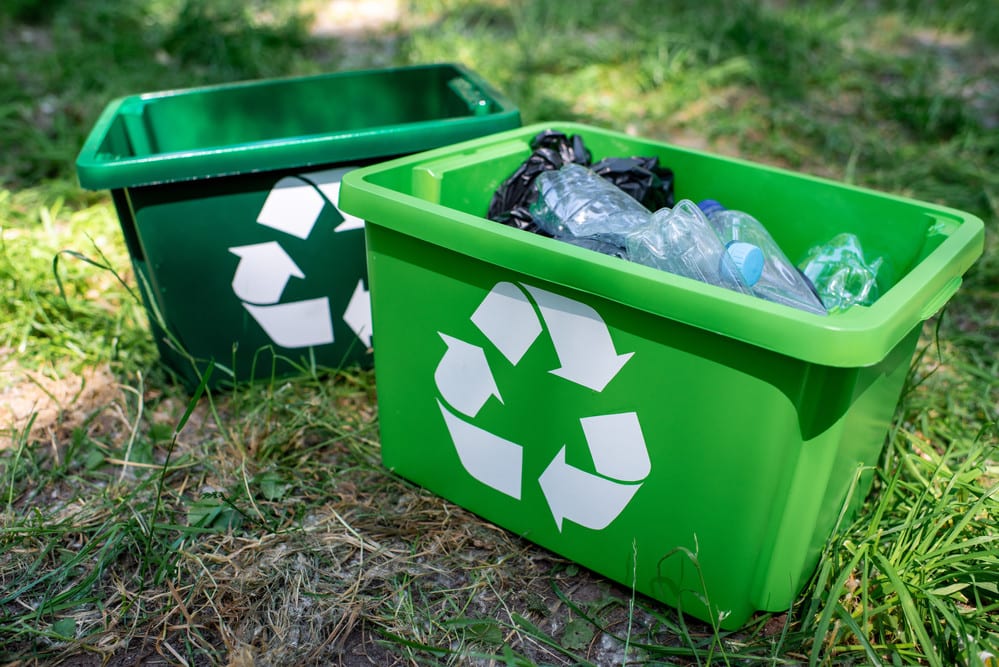It’s easy to feel small when you consider the size of the Earth and the magnitude of humans’ impact on the environment. However, you should never let this stop you from trying to minimize the damage that you personally inflict on the environment. If we all take small steps forward, we can make a huge difference. Not sure where to start? Scroll down to discover 15 easy ways to help the environment.
15 Easy Ways to Help the Environment
1. Carpool or use public transit whenever possible.
A vehicle transporting a single person produces a significant amount of pollution. To reduce the amount of energy used and pollution produced per passenger, carpool with friends when possible or use public transportation options if they’re available to you. And if your destination is nearby, remember that you could always walk there instead!
2. Wash your clothes in cold water and hang dry.
Using cold water instead of warm or hot water saves energy and will make your clothes last longer. And by air-drying your laundry, you can eliminate your dryer’s energy output.
3. Use energy-efficient light bulbs.
You don’t need to replace all your light bulbs immediately, but as each one burns out, replace it with an energy-efficient product. Not only will you lower your energy usage, but you’ll also decrease your utility bills.
4. Make sure your home is properly insulated.
When your home isn’t properly insulated, your HVAC system must work harder to maintain the interior temperature. You could also be suffering from high energy bills, chilly drafts, and moisture damage. Use these tips from Energy Star to check for insulation issues or consider calling in a professional to conduct a comprehensive audit.
5. Use reusable shopping bags.
Plastic bags are typically used only once and rarely recycled. To reduce the amount of waste you send to landfills, consider purchasing a reusable bag and using it every time you shop. When you do use plastic or paper bags, try to reuse them afterward and then recycle them when they’re no longer functional.
6. Compost food scraps and yard waste.
By composting, you can transform your food scraps and yard waste into organic material that can be added to soil to help plants grow. It also reduces the amount of waste in landfills and limits the amount of methane (a greenhouse gas) emitted from landfills. You could create a compost bin in your backyard, use an indoor compost bin, or take advantage of resources in your community (for example, some public gardens and farmers’ markets offer composting services).
7. Turn off lights when you’re not in the room.
We all know this important rule! If you don’t need the light, why waste the electricity?
8. Turn off electronics that are not in use.
Did you know that many of your electronics consume a constant stream of power, even when you’re not using them? Common examples include microwaves, printers, stereos, TVs, desktop computers, laptops, and DVD players. When you combine all the “phantom energy” drawn from your outlets, it’s surprisingly significant. While you could unplug your electronics after every use, we know this can be a hassle. Instead, consider hooking multiple items up to a power strip, which you can turn off with the flip of a switch.
9. Eat less meat.
Believe it or not, this is one of the most impactful easy ways to help the environment! The production of animal products creates potent greenhouse gases, uses a significant amount of water and crops, and pollutes waterways. And while meat is a good source of protein and some other nutrients, most Americans eat more than 1.5 times the average daily protein requirement (source). Cutting back on your meat consumption – even just a little – can help the Earth as well as global food security.
10. Recycle everything that it is possible for you to recycle.
Once you get into the habit of recycling, it’s hard to turn back! Check out the EPA’s Recycling Basics page to learn what you can recycle, how you can recycle, and how recycling benefits the environment and our communities. Be sure to learn about your city’s recycling program as well.
11. Don’t waste water.
Most of us don’t realize how often we waste water. If you’re trying to cut back, check out the following ideas:
- Take shorter showers.
- Turn off the faucet while scrubbing dishes, brushing your teeth, etc.
- Don’t turn on the shower until you’re ready to hop in.
- Water your lawn in the early morning or evening to ensure the water doesn’t quickly evaporate.
- Install a low-flow showerhead and faucet aerator.
12. Buy less stuff.
More stuff equals more waste. Whether it’s groceries, clothes, or silly tchotchkes, only buy what you truly need or truly love. This is one of the simplest easy ways to help the environment because it doesn’t require any action. You don’t need to do anything; you need to stop doing something.
13. Only eat sustainable seafood.
By only purchasing sustainable seafood, you can put your money behind fish that has been caught or farmed in an environmentally responsible way. Check out Oceana’s guide to learn which fish is okay to eat, which species contain high levels of mercury or PCBS, and which species are currently overfished (and should therefore be avoided).
14. Don’t buy bottled water.
Not only does the life cycle of bottled water use fossil fuels and cause pollution, but also bottled water is expensive and unnecessary! Plus, “Bottled water generally is no cleaner, or safer, or healthier than tap water. In fact, the federal government requires far more rigorous and frequent safety testing and monitoring of municipal drinking water” (source).
15. Only buy the amount of food you need, and eat your leftovers.
Food production requires a lot of energy and produces pollution, and food waste contributes to landfills. So when you go grocery shopping or eat out, only purchase what you know you will eat. And if you have leftovers, eat them. It’s as simple as that!
_____
Without much effort, you can embrace some (or perhaps even all) of these easy ways to help the environment and reduce your carbon footprint. Plus, you may inspire some of your friends or family members to do the same!
If you’re looking for a new home where you can enjoy your golden years, check out The Shores of Lake Phalen in Maplewood, Minnesota. Located in a wooded setting near two lakes, our community offers apartment-style housing with the atmosphere and elegance of a resort. Thanks to the team of dedicated staff members, residents enjoy a carefree lifestyle without the common worries of running a household. Schedule a tour to explore our community or give us a call at 651-777-7784. We look forward to hearing from you!

